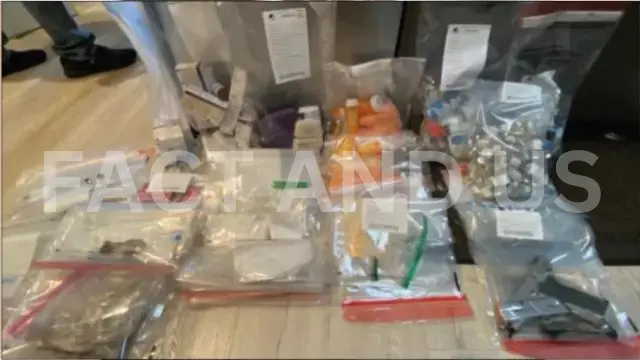The recent death of beloved actor Matthew Perry has cast a spotlight on the controversial use of ketamine in Hollywood, exposing what many are calling a “wild west” of unchecked and unregulated drug use within the industry.

Perry, best known for his role as Chandler Bing on the iconic TV show Friends, was found dead at his Los Angeles home. The news of his passing has sent shockwaves through both the entertainment world and his legion of fans. As authorities investigate the circumstances surrounding his death, reports suggest that ketamine, a powerful anesthetic increasingly used recreationally and for off-label treatments, may have played a role.
Ketamine, originally developed as a surgical anesthetic, has gained popularity in recent years for its off-label use in treating depression and other mental health conditions. However, its rising use in Hollywood has sparked concerns about its safety and the lack of oversight surrounding its administration.
In the entertainment industry, where the pressures of fame and success often lead people to seek unconventional solutions for mental health issues, ketamine has found a foothold. Despite its potential therapeutic benefits when used under medical supervision, its recreational use and the lack of standardized protocols for its administration have raised alarms.
Experts and insiders are now calling for greater regulation and transparency in the use of ketamine, especially in high-profile circles where its misuse can have devastating consequences. “The situation is akin to the Wild West,” says Dr. Emily Carter, a Los Angeles-based psychiatrist. “There’s a lack of clear guidelines and oversight, and people are experimenting with substances that carry significant risks.”

Perry’s death has become a rallying point for those advocating for stricter controls and better education about the use of substances like ketamine. Advocates argue that more robust regulations and informed medical supervision are essential to prevent future tragedies and ensure that treatments are both safe and effective.
As the Hollywood community grapples with the loss of one of its stars, there is a growing call for reform. Discussions are underway about the need for clearer regulations and better support systems for those struggling with mental health issues in the spotlight. Perry’s death, while a tragic loss, has become a critical moment for reflection and change in how the industry addresses mental health and substance use.
The conversation about ketamine and its role in Hollywood is far from over. As the industry seeks to understand and address these issues, the hope is that Perry’s passing will lead to meaningful changes that protect and support those who navigate the often turbulent waters of fame and mental health.
Contents
An Underground Network
Federal authorities said their investigation into Perry’s death uncovered a “broad underground criminal network” of drug suppliers who distributed large quantities of ketamine across Los Angeles. Federal court documents detail Perry’s last months alive and the transition from his treatments at a ketamine clinic for depression and anxiety, where a physician administered the drug and monitored for side effects, to an addiction that led him to “unscrupulous doctors” and a network of street dealers.
Perry had been open about his addiction problems, which go back decades—even to his time playing Chandler Bing on Friends. If a drug entered his life, he seemed to become addicted. But in his memoir Friends, Lovers, and the Big Terrible Thing, he said he’d finally gotten sober, and one woman told investigators at the coroner’s office that she believed he had been sober for 19 months.

Somewhere in that time, Perry started receiving ketamine infusion therapy. Experts say Perry’s history of addiction helped lead him to quickly become hooked on the drug.
The federal investigation found that over a nearly two-month span before his death, Perry purchased dozens of vials of ketamine for thousands of dollars. In the three days before his death, his assistant injected him at least six times a day with ketamine shots.
- Kenneth Iwamasa: Perry’s live-in personal assistant pleaded guilty to one count of conspiracy to distribute ketamine resulting in death. He admitted to helping Perry find ketamine and repeatedly injecting him with the drug, including the fatal dose.
- Dr. Salvador Plasencia: A physician accused of supplying Perry with large quantities of ketamine, injecting him on multiple occasions—including in a public parking lot—and teaching his assistant how to administer the injections. He has pleaded not guilty to all charges arising from Perry’s death.
- Dr. Mark Chavez: A physician who pleaded guilty to one count of conspiracy to distribute ketamine. He admitted to selling ketamine to Dr. Plasencia, including drugs he had diverted from a ketamine clinic.
- Jasveen Sangha, described by law enforcement as the “Ketamine Queen”: An alleged street dealer known to work with celebrities and high-end clients. She is accused of supplying the drugs that ultimately killed Perry. Authorities raided her home and discovered what they called a “drug-selling emporium” with dozens of ketamine vials and thousands of pills. She has pleaded not guilty to all charges against her, including conspiracy to distribute ketamine and distribution of ketamine resulting in death.
- Eric Fleming: A middleman who authorities say got drugs from Sangha and distributed them to Perry and his assistant. He pleaded guilty to one count of conspiracy to distribute ketamine and one count of distribution of ketamine resulting in death.

Stay connected with Fact and US for more such news.
